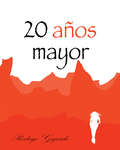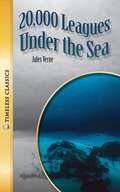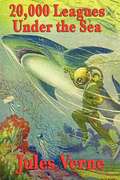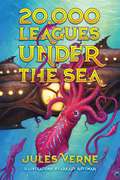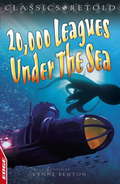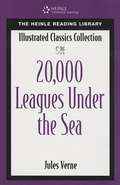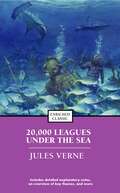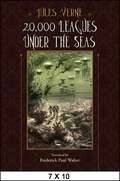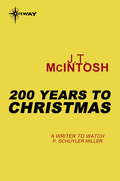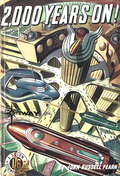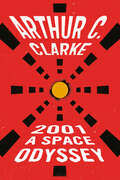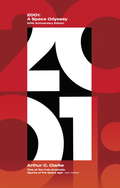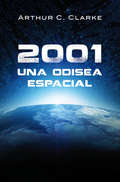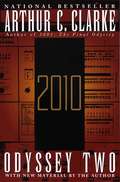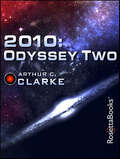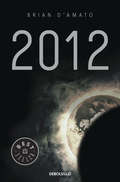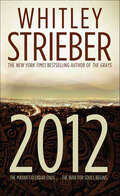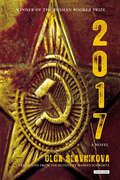- Table View
- List View
20 años mayor
by Rodrigo GajardoVas a reír, sorprenderte y llorar. Pero lo más importante: te enamorarás. 20 años mayor es una novela que juega bruscamente con las leyes de las probabilidades. Te sorprenderás al saber lo que puede ocurrir con este mundo y lo que tal vez ya ha sucedido. ¿Puedes creer que viajar al futuro, es posible? La fantasía puede ser solamente una realidad oculta. La vida de Harry, un chico ordinario y ateo, cambia por completo cuando lo imposible parece ser posible. Cuando Jesús aparece en su vida, no solo duda de su existencia, sino que comienza una aventura que nunca esperó vivir. Su misión es clara: no puede enamorarse de Jesús.
20,000 Leagues Under The Sea
by Jules Verne Judith Conaway Gino D'AchilleProfessor Aronnax and his crew become prisoners of Captain Nemo, an adventurous underwater explorer. Will the professor and his crew ever escape, or will they travel the world with the crazy captain for the rest of their lives?
20,000 Leagues Under The Sea (Timeless Classics Series)
by Jules Verne Emily HutchinsonThemes: Hi-Lo, adapted classics, low level classics, after-reading question at the end of the book. Timeless Classics--designed for the struggling reader and adapted to retain the integrity of the original classic. <P><P>These classic novels will grab a student's attention from the first page. Included are eight pages of end-of-book activities to enhance the reading experience. <P><P>Searching for a sea monster, a scientist discovers an amazing underwater vessel. At first he's thrilled to be invited aboard the Nautilus. What changes his mind? He discovers that the mad captain plans to stay at sea forever.
20,000 Leagues Under the Sea
by Jules VerneENDURING LITERATURE ILLUMINATED BY PRACTICAL SCHOLARSHIP A group of men set sail to solve the mystery of a sea monster in this amazing underwater adventure. EACH ENRICHED CLASSIC EDITION INCLUDES: A concise introduction that gives readers important background information A chronology of the author's life and work A timeline of significant events that provides the book's historical context An outline of key themes and plot points to help readers form their own interpretations Detailed explanatory notes Critical analysis, including contemporary and modern perspectives on the work Discussion questions to promote lively classroom and book group interaction A list of recommended related books and films to broaden the reader's experience Enriched Classics offer readers affordable editions of great works of literature enhanced by helpful notes and insightful commentary. The scholarship provided in Enriched Classics enables readers to appreciate, understand, and enjoy the world's finest books to their full potential. SERIES EDITED BY CYNTHIA BRANTLEY JOHNSON
20,000 Leagues Under the Sea
by Jules VerneTwenty Thousand Leagues Under the Sea is a classic science fiction novel by French writer Jules Verne published in 1870.
20,000 Leagues Under the Sea
by VerneDive into this beautiful edition of a time-honored classic with new illustrations!Originally published in the late 1800s, 20,000 Leagues Under the Sea has captivated readers for nearly two centuries. This edition, enhanced with lavish full-color illustrations by artist Arkady Roytman, is the premier edition of this time-honored classic. The story follows Professor Aronnax, his faithful servant, Conseil, and the Canadian harpooner, Ned Land, and dangerous mission to rid the seas of terrifying monster that lurks in the depths of the sea. However, the "monster" turns out to be a giant submarine, commanded by the mysterious Captain Nemo, by whom they are soon held captive. So begins not only one of the great adventure classics by Jules Verne, but also a truly fantastic voyage from the lost city of Atlantis to the South Pole.
20,000 Leagues Under the Sea (EDGE: Classics Retold #3)
by Jules VerneProfessor Arronax and his men are kidnapped and held aboard the submarine Nautilus, piloted by the mysterious Captain Nemo. Deep under the sea they glimpse the lost city of Atlantis, dodge icebergs and do battle with a mighty giant squid. But will the Professor and his men ever manage to escape Captain Nemo and the Nautilus?Adapted by Lynne Benton from the original novel by Jules Verne.A series of adaptations of well-known stories, designed to introduce young readers to the classics. Divided into short chapters and illustrated with modern black and white artwork, each title will offer the reader an accessible and exciting read.
20,000 Leagues Under the Sea (Illustrated Classic Editions)
by Jules Verne Malvina G. VogelNarrated through the eyes of Professor Pierre Aronnax, this classic science fiction is about tracking and hunting down of a sea monster that's causing havoc in the seas.
20,000 Leagues Under the Sea: Reader (Enriched Classics)
by Jules VerneENDURING LITERATURE ILLUMINATED BY PRACTICAL SCHOLARSHIP A group of men set sail to solve the mystery of a sea monster in this amazing underwater adventure. EACH ENRICHED CLASSIC EDITION INCLUDES: A concise introduction that gives readers important background information A chronology of the author's life and work A timeline of significant events that provides the book's historical context An outline of key themes and plot points to help readers form their own interpretations Detailed explanatory notes Critical analysis, including contemporary and modern perspectives on the work Discussion questions to promote lively classroom and book group interaction A list of recommended related books and films to broaden the reader's experience Enriched Classics offer readers affordable editions of great works of literature enhanced by helpful notes and insightful commentary. The scholarship provided in Enriched Classics enables readers to appreciate, understand, and enjoy the world's finest books to their full potential. SERIES EDITED BY CYNTHIA BRANTLEY JOHNSON
20,000 Leagues Under the Seas: A World Tour Underwater (Excelsior Editions)
by Jules VerneWhen an unidentified "monster" threatens international shipping, French oceanographer Pierre Aronnax and his unflappable assistant Conseil join an expedition organized by the US Navy to hunt down and destroy the menace. After months of fruitless searching, they finally grapple with their quarry, but Aronnax, Conseil, and the brash Canadian harpooner Ned Land are thrown overboard in the attack, only to find that the "monster" is actually a futuristic submarine, the Nautilus, commanded by a shadowy, mystical, preternaturally imposing man who calls himself Captain Nemo. Thus begins a journey of 20,000 leagues—nearly 50,000 miles—that will take Captain Nemo, his crew, and these three adventurers on a journey of discovery through undersea forests, coral graveyards, miles-deep trenches, and even the sunken ruins of Atlantis. Jules Verne's novel of undersea exploration has been captivating readers ever since its first publication in 1870, and Frederick Paul Walter's reader-friendly, scientifically meticulous translation of this visionary science fiction classic is complete and unabridged down to the smallest substantive detail.
200 Years to Christmas
by J. T. McIntoshFor almost two centuries the huge spaceship had speared its way through the stars, bound for another two hundred years of travel before it would put down on a new planet, a new home for the Earth people.On board the metal-enclosed worldlet were four hundred people: the last survivors of Earth. It was up to them to start life anew, to correct the mistakes their ancestors made.But as the tenth generation neared maturity, the idle passengers found themselves face to face with these same problems - and this time there was no place to run and hide or to postpone their answers. For their miniature society was changing faster and faster. An the spaceship suddenly seemed destined to end as a star-bound coffin.
2000 Years On
by John Russell Fearn Vargo StattenJeremy Clyde is a young scientist who discovers that Time is a circle, and that deep within the human brain is a memory 'hangover' of future and past events. He carries out an experiment on himself and succeeds in mentally projecting his body 2,000 years into the future. Here he learns that his arrival in 3950 has been anticipated, and incredibly, he is appointed as the nominal ruler of the four inhabited inner planets, Mercury, Venus, Earth and Mars. But he discovers he is only a puppet for a ruthless governing system being secretly maintained by malign Jovians. Clyde joins forces with his counterparts on the three other planets and battles to throw off the alien yoke...
2000 Years On
by John Russell Fearn Vargo StattenA scientist travels in time to the year 3950 where he finds himself the prophesied ruler of an oppressed Earth and conquered planets: Mercury, Venus and Mars. This super scientific dystopian Empire, founded as a world government on Earth after the 1970 atomic war left civilization in ruins, is preparing to conquer the remainder of the Solar System.
2001: A Space Odyssey
by Arthur C. ClarkeThe year is 2001, and cosmonauts uncover a mysterious monolith that has been buried on the Moon for at least three million years. To their astonishment, the monolith releases an equally mysterious pulse—a kind of signal—in the direction of Saturn after it is unearthed. Whether alarm or communication, the human race must know what the signal is—and who it was intended for. The Discovery and its crew, assisted by the highly advanced HAL 9000 computer system, sets out to investigate. But as the crew draws closer to their rendezvous with a mysterious and ancient alien civilization, they realize that the greatest dangers they face come from within the spacecraft itself. HAL proves a dangerous traveling companion, and the crew must outwit him to survive. <P> This novel version of the famous Stanley Kubrick film 2001: A Space Odyssey was written by Clarke in conjunction with the movie’s production. It is meant to stand as a companion piece, and it offers a complementary narrative that’s loaded with compelling science fiction ideas.
2001: A Space Odyssey
by Arthur C. ClarkeTwo astronauts find their journey into space and their very lives jeopardized by the jealousy of an extraordinary computer named Hal.
2001: A Space Odyssey
by Arthur C. ClarkeWritten when landing on the moon was still a dream, made into one of the most influential films of our century, brilliant, compulsive, prophetic, 2001: A Space Odyssey tackles the enduring theme of man's place in the universe. Including a new Foreword by the author and a fascinating new introduction by Stephen Baxter, this special edition is an essential addition to every SF reader's collection.On the moon an enigma is uncovered. So great are the implications that, for the first time, men are sent out deep into the solar system. But, before they can reach their destination, things begin to go wrong. Horribly wrong.
2001: A Space Odyssey (Space Odyssey Ser.)
by Arthur C. ClarkeWritten when landing on the moon was still a dream, and made into one of the most influential films of all time, 2001: A SPACE ODYSSEY remains a classic work of science fiction fifty years after its original publication. The discovery of a black monolith on the moon leads to a manned expedition deep into the solar system, in the hope of establishing contact with an alien intelligence. Yet long before the crew can reach their destination, the voyage descends into disaster . . . Brilliant, compulsive and prophetic, Arthur C. Clarke's timeless novel tackles the enduring theme of mankind's place in the universe.Praise for Arthur C. Clarke:'The king of science fiction . . . His influence continues to inform the genre' Guardian'Arthur C. Clarke is awesomely informed about physics and astronomy, and blessed with one of the most astounding imaginations ever encountered in print' New York Times'Arthur C. Clarke is one of the truly prophetic figures of the space age . . . The colossus of science fiction' New Yorker 'Dazzling' Time
2001: Una Odisea Espacial (Odisea espacial #Volumen 1)
by Arthur C. ClarkeUn gran clásico de la ciencia ficción. Los doctores David Bowman y Frank Poole se encuentran a bordo del Discovery One con el objetivo de realizar una expedición a los confines del universo en busca de evidencias que confirmen que el ser humano no está solo. Les acompañan tres científicos en animación suspendida y HAL 9000, un ordenador excepcionalmente inteligente. Pero la misión se vuelve muy peligrosa cuando HAL empieza a fallar. ¿Se trata de un problema técnico? ¿O quizá Hal tiene voluntad propia? ¿Qué influencia ejerce el monolito? Con estas preguntas, surgen otras: ¿Cuál es nuestra esencia? ¿Qué lugar ocupamos en el cosmos? Uno de los grandes clásicos de la ciencia ficción, que ofrece una visión totalizadora sobre el origen de la consciencia y la evolución de la humanidad. Arthur C. Clarke colaboró estrechamente con Stanley Kubrick en la producción de la célebre película homónima. Reseña:«Clarkemezcla con maestría hallazgos, filosofía y un novedoso sentido del ritmo.»Time
2001: Una odisea espacial
by Arthur C. ClarkeUna expedición a los confines del universo y a los del alma, en la que pasado, presente y futuro se amalgaman en un continuo enigmático. ¿Qué esencia última nos rige? ¿Qué lugar ocupa el hombre en el complejo entramado del infinito? ¿Qué es el tiempo, la vida, la muerte? Una grandiosa novela de dimensiones épicas cuyo amplio abanico de interpretaciones ofrece una visión totalizadora. Arthur C.Clarke colaboró estrechamente con Stanley Kubrick en la producción de la célebre película homónima.
2010: Odyssey Two
by Arthur C. ClarkeAn instant book and movie classic, its fame has grown. Yet, a host of questions has grown more insistent, for example: who or what transformed Dave Bowman into the Star-Child? What alien purpose lay behind the monoliths on the Moon and out in space? What could drive HAL to kill the crew? Now all those questions have been answered, in this stunning sequel. Cosmic in sweep, eloquent in its depiction of Man's place in the Universe, and filled with the romance of space, this novel is a good read.
2010: Odyssey Two (Space Odyssey Series #2)
by Arthur C. ClarkeThe celebrated author continues his Space Odyssey with this Hugo Award winner: &“A daring romp through the solar system and a worthy successor to 2001&” (Carl Sagan). In 1968, Arthur C. Clarke&’s bestselling 2001: A Space Odyssey captivated the world and was adapted into the classic film by Stanley Kubrick. Fourteen years later, fans and critics were thrilled by the release of 2010: Odyssey Two. Nine years after the ill-fated Discovery One mission to Jupiter, a joint Soviet-American crew travels to the planet to investigate the mysterious monolith orbiting the planet, the cause of the earlier mission&’s failure—and what became of astronaut David Bowman. The crew includes project expert Heywood Floyd, and Dr. Chandra, the creator of HAL 9000. What they discover is an unsettling alien conspiracy tampering with the evolution of life on Jupiter&’s moons as well as that of humanity itself. Meanwhile, the being that was once Dave Bowman—the only human to unlock the mystery of the monolith—streaks toward Earth on a vital mission of its own . . . &“Clarke deftly blends discovery, philosophy, and a newly acquired sense of play.&” —Time &“2010 is easily Clarke&’s best book in over a decade.&” —The San Diego Union-Tribune
2012
by Brian Damato21 de diciembre de 2012.El día en que el tiempo se detendrá.Jed DeLanda, descendiente de los mayas, tiene una mente prodigiosa para las matemáticas y pasa la mayor parte de su tiempo jugando al go contra su ordenador mientras vive de los beneficios que le dan sus negocios en la red. ¿Su arma secreta? El juego de adivinación maya utilizado antiguamente para predecir acontecimientos del futuro. Pero el fin del mundo se acerca. Comienza la cuenta atrás. Jed deberá averiguar por qué los mayas predijeron el fin de los tiempos en esa fecha e iniciar la búsqueda de la clave que le ayude a evitar el Armagedón. ¿Podrá un solo hombre salvar al planeta?« Brian DAmato conjuga la historia maya, la ciencia moderna, la teoría del juego y el inminente Apocalipsis maya en un mismo relato, consiguiendo como resultado una lectura absorbente y emocionante.»Douglas Preston
2012
by Whitley StrieberDecember 21, 2012, may be one of the most watched dates in history. Every 26,000 years, Earth lines up with the exact center of our galaxy. At 11:11 on December 21, 2012, this event happens again, and the ancient Maya calculated that it would mark the end, not only of this age, but of human consciousness as we know it.But what will actually happen? The end of the world? A new age for mankind? Nothing? The last time this happened, Cro-Magnon man suddenly began creating great art in the caves of southern France, which to this day remains one of the most inexplicable changes in human history. Now Whitley Strieber explores 2012 in a towering work of fiction that will astound readers with its truly new insights and a riveting roller-coaster ride of a story. A mysterious alien presence unexpectedly bursts out of sacred sites all over the world and begins to rip human souls from their bodies, plunging the world into chaos it has never before known. Courage meets cowardice, loyalty meets betrayal as an entire world struggles to survive this incredible end-all war. Heroes emerge, villains reveal themselves, and in the end something completely new and unexpected happens that at once lifts the fictional characters into a new life, and sounds a haunting real-world warning for the future.At the Publisher's request, this title is being sold without Digital Rights Management Software (DRM) applied.
2017: A Novel
by Olga SlavnikovaAn award–winning &“satirical political thriller follows the . . . adventures of a Russian gem cutter . . . and the consequences of his affair with a virtual stranger.&”(Publishers Weekly) Professor Anfilogov, a wealthy and emotionless man, sets out on an expedition to unearth priceless rubies that no one else has been able to locate. His expedition reveals ugly truths about man&’s disregard for nature and the disasters created by insatiable greed. In 2017, winner of the Russian Booker Prize, Olga Slavnikova stuns with a witty, engaging, and remarkable tale of love, obsession, murder, and the lengths people will go to get what they want. &“Slavnikova&’s characters are magnetizing, and her crystal clear vision of a world in which &‘commercial infinities&’ choke off humanism and art is salubriously caustic.&” —Booklist
2020 - The Revelation
by Raquel Pagno Andréa Dos SantosThe scientist Jessica Salles didn't stop complaining, especially after her discovery was announced as the merit of her former teacher. It was not easy to admit that the science academy had ignored her. Only Father Victor, expulsed by Cornelio from the USP laboratories, had shown interest in her research. They became friends until Victor was attacked, almost losing his life. Police had linked the beating to other murders. But why had he survived? Suddenly Jessica's life was upside down. Victor had given her a mission: to travel to El Salvador, meet the ARL research centre, and find scientist Eduardo Miller, who would reveal to her the whole truth about the prophecies. But before Miller could give her explanations, nature had shown its fury... Now she needed to reach the legendary Mayan temple and help the chosen one in his mission. The future of all mankind is in her hands. If she fails, everyone will die!
